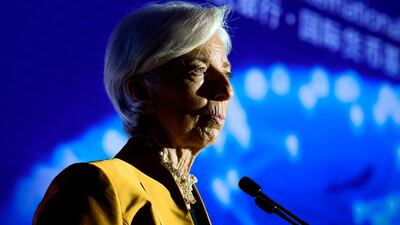Last week, the International Monetary Fund's executive board convened “an informal meeting” in anticipation of what managing director Christine Lagarde called “the Argentine authorities’ intention to request an exceptional Stand-By Arrangement.”
The May 18 gathering to discuss significant financial assistance for the South American country’s economic reforms and to restore market confidence was an unusual step for the IMF, which has gone through its share of complicated rescues.
This atypical meeting didn't come about because of today’s Argentine case. Instead, it was the result of the country's historical relations with the fund.
There are four important reasons why, on paper and without a deeper historical perspective, Argentina’s approach to the IMF wouldn’t seem particularly complicated, even though it is:
First, Ms Lagarde reiterated the widely-held view that Argentina's government, led by President, Mauricio Macri, is “engaged in fundamental and welcome transformation of its economy” and is “conscious of the need to build and maintain social consensus in the pace of calibrating the pace" of reform.
Second, Argentina’s efforts have been complicated by exogenous shocks, including a drought that undermined agricultural output, and tighter global financial conditions caused in part by rising US interest rates, an appreciating dollar and higher oil prices.
Third, the recent bout of “significant financial volatility” demonstrated by a sharp drop in the value of the peso and higher sovereign-risk spreads has been amplified by economic-policy mismanagement steps. The slips include a badly timed increase in the central bank’s inflation target and currency intervention that suggested an insufficient understanding of international market dynamics. These have exposed vulnerabilities due to relatively high debt and twin deficits (government budget and the current account of the balance of payments).
Fourth, corrective steps have already started, including an increase of policy rates to an eye-popping 40 per cent and the pursuit of greater fiscal adjustment.
Yet it seems that both Argentina and the IMF don't regard these conditions as sufficiently compelling to pursue the more traditional route to a financing agreement. Instead, both sides are taking extra care (and steps) to keep key constituencies informed and, hopefully, on board. And for good reasons.
An already complicated historical relationship was taken to its limits before and after Argentina’s sovereign default in December 2001. This highly visible and costly debacle highlighted how the two sides had fallen into an unhealthy interdependency over the years. The relationship ultimately proved irreconcilable, and its demise was followed by a nasty blame game.
_______________
Read more:
IMF to approve $2bn payment to Egypt
Greece and creditors agree final bailout review terms
_______________
Despite repeated warning signs, the IMF continued to support an unsustainable financial configuration in Argentina, including through repeated lending even though its basic conditions of “financial assurances” were not being met.
Argentina played a cat-and-mouse game with the fund, periodically feeding a national culture of mistrust that undermined domestic ownership of reforms and soured the IMF’s standing as the country fell into recession, inflation and default. This further damaged the institution's reputation for good judgement, deep expertise and adherence to its even-handed approach to uniformity of treatment for member countries.
The unusual board meeting on May 18 served notice that there is a lot more to the current negotiations than the important objectives of the IMF helping to support Argentina’s reforms, restore calm to its financial markets and contain potentially damaging spillovers to other emerging countries.
The negotiations mean Argentina and the fund are again underwriting huge reputational risks that extend well beyond the economics and finance of this particular country case.
It wouldn’t be an exaggeration to say that Mr Macri is putting almost his entire domestic political capital on the line. Failure to secure support for a well-designed and effective homegrown programme would add political uncertainty, even as Argentina probably would experience recession, high inflation, an unstable currency and other financial dislocations.
The IMF, meanwhile, is bracing for greater demands for its services as the emerging world navigates tougher global financial conditions and as advanced countries look for ways to better reconcile their domestic priorities with their international obligations and responsibilities. This is not the time for renewed worry about the fund's effectiveness.
As they complete their negotiations, the two sides would be well advised to remember simple advice that I heard from a high-level country official in my first exposure to IMF programme negotiations in 1983, shortly after I joined the fund out of graduate school: always make sure to commit to what you can deliver, and to deliver what you commit to.
Mohamed El Erian is a Bloomberg View columnist. He is the chief economic adviser at Allianz SE, the parent company of Pimco, where he served as CEO and co-CIO. He was chairman of the president's Global Development Council, CEO and president of Harvard Management Company, managing director at Salomon Smith Barney and deputy director of the IMF. His books include "The Only Game in Town" and "When Markets Collide."

